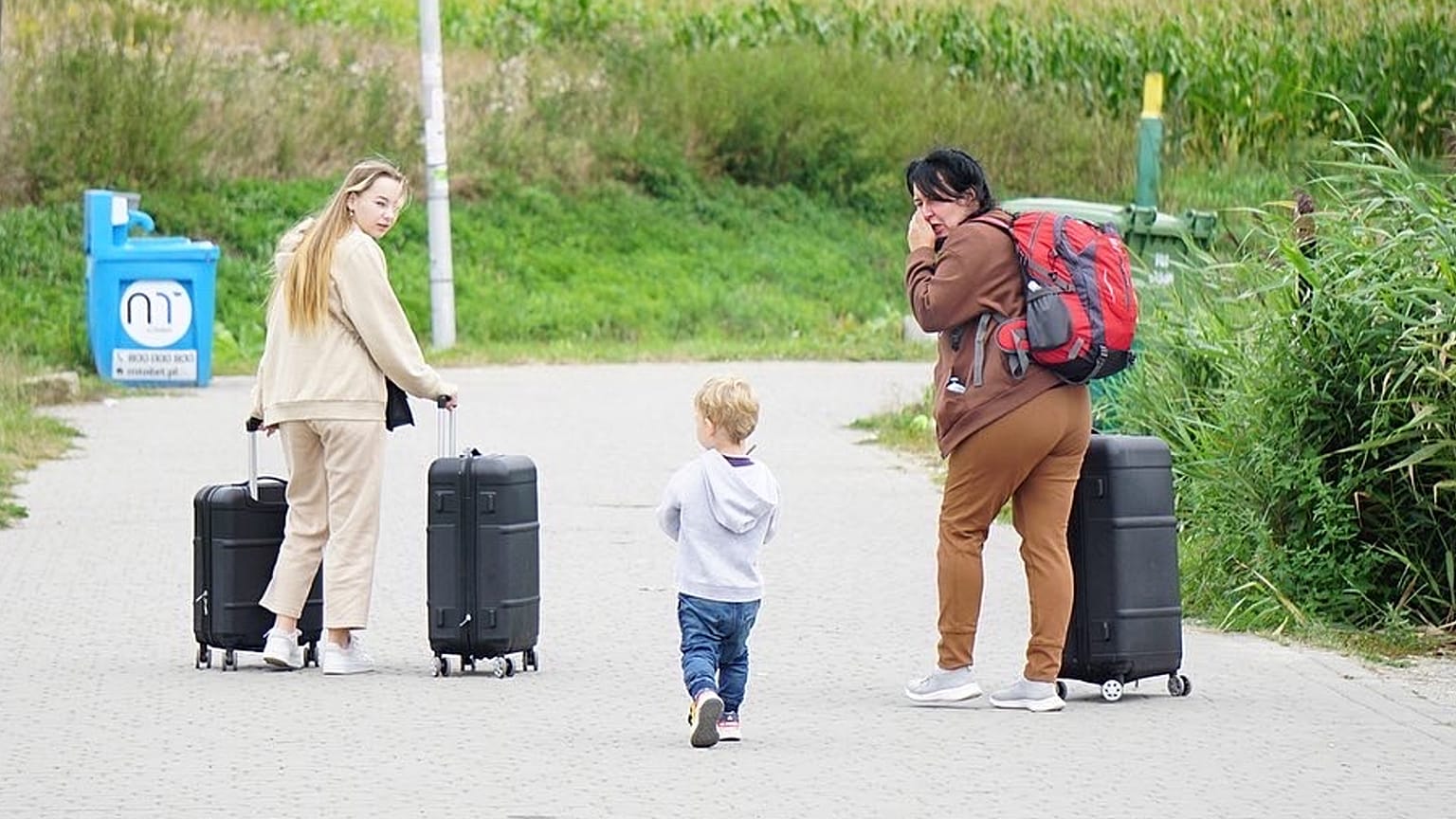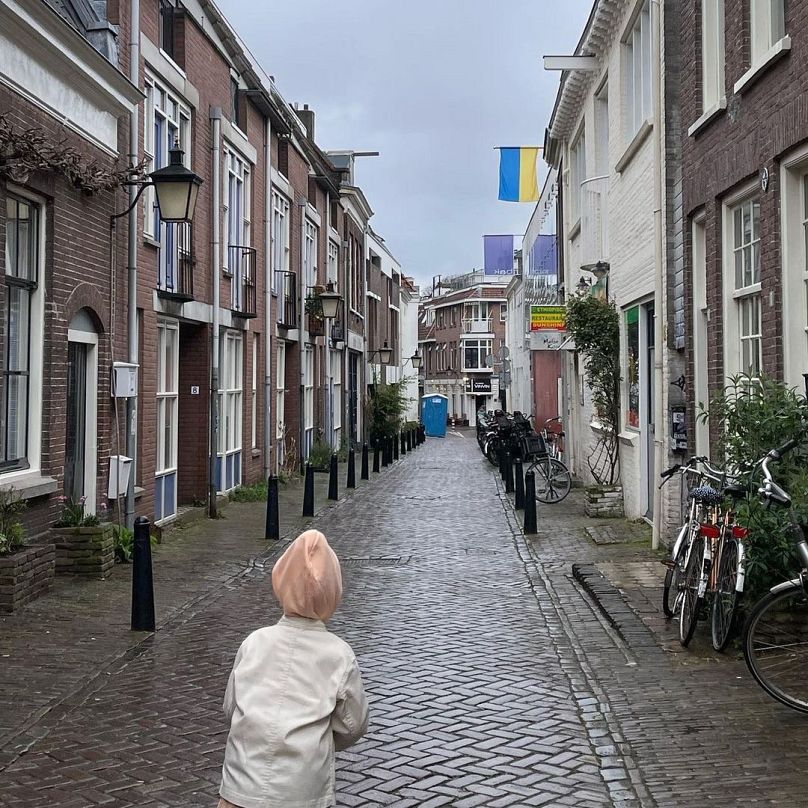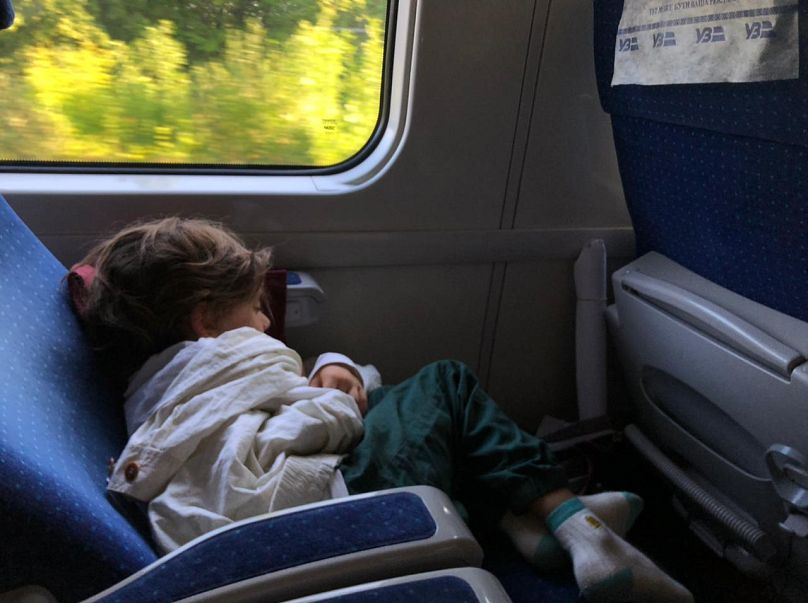A month after moving to Kyiv, Iuliia said it feels "very good" to be back home.
When war first broke out in Ukraine, Yevheniia Soia, 25, said it was hard to understand the reality of the war until she heard the first explosions.
 ADVERTISEMENT
ADVERTISEMENT
 ADVERTISEMENT
ADVERTISEMENT
“There was no time or energy to think about it, we just monitored the news, ran to the [train] at every siren, and looked at the long traffic jam of cars and people trying to leave the city,” she said.
She decided to travel from Mariupol to the western city of Lviv where she joined her former partner and five-year-old daughter Lea. She and her daughter eventually fled their home country for The Netherlands.
But now she’s one of many Ukrainians that has made the decision to go back home, resettling in Kyiv with her family.
Deciding to return to Ukraine
Soia is not alone.
The war in Ukraine resulted in the largest refugee crisis since World War II with some 7.2 million Ukrainian refugees across Europe, according to the UN Refugee Agency.
But some of those refugees are now returning to Ukraine, with the International Organization for Migration reporting in June that 5.5 million displaced persons had returned to their homes with around 10% of them coming from abroad.
Before returning to her country, Soia had started a new life in the Netherlands.
A family hosted her and her daughter in their vacation house in the village of Oostkapelle. Soia said the area was "calm, next to the sea, where we could wait for a better situation for returning to Kyiv."
While in Oostkapelle, Soia volunteered with Ukrainian families, her daughter went to school, and they travelled throughout the country, protesting the war in their homes.
But, in the country foreign to the young mother and seven other Ukrainian families she met, there was a sense of unknown and "what to do now."
"All of them were scared of a bunch of things: How to find work, pay taxes, find a school for your kids, visit the doctor….but all of them were prepared to stay at least for a year and wait because they were scared of the whole economy and safety [in Ukraine], and that was a difficult choice," she added.
Yet three months after arriving in the Netherlands, she decided to head to Kyiv.
“Everything opened up again, everything is working. My family evacuated from Mariupol to Kyiv and started their new life, and I wanted to help. The situation started to be safer,” she said.
Thinking of home all the time
Soia’s story was echoed by that of 33-year-old Iuliia who was on vacation in Tbilisi, Georgia, with her husband Roman and their six-year-old son, Leo when the war started.
The family had only planned to be away from their Kyiv apartment for a week.
When Iuliia saw that war had started in Ukraine, she was in a panic that lasted almost two weeks when she thought about her friends and family in Ukraine.
She ended up moving with her husband and son to Berlin, where they spent time in various people's homes and were welcomed warmly, she said.
But Iuliia felt uneasy about her new home.
She said it felt "terribly strange, especially before you dreamed of visiting Berlin. When you find yourself in such conditions, you feel trapped.”
"You think it will end soon, then you fall into despair, then again some adrenaline-fuelled optimism, in one day you cover absolute polar states, like some sick roller coaster. No pleasure to be in the city you wanted to visit in your past life," said Iuliia.
Over the next few months, being away from Ukraine impacted Iuliia and her husband. They both tried to remain strong for their son but were "broken emotionally."
Eventually, the pain Iuliia felt became more intense, and she and her husband started planning to move back to Ukraine.
"We thought about it all the time. You live permanently in a state where you want to go home. We couldn't wait for an ephemeral, more appropriate time," said Iuliia.
Indeed, a recent UN refugee agency survey released in July found that the majority of Ukrainian refugees hoped to return home as soon as possible. Most plan to stay in their host countries however until the security situation improves.
While on the 13-hour train ride from Berlin to Kyiv, Iuliia reflected on what it meant to go home.
Iuliia said that she was aware that Kyiv is under constant attack and that she will do everything to "ensure the safety of the child. If we have to leave for this, we will leave."
Adapting to life again in Ukraine
Back in Ukraine, it took time for Soia to adjust.
She was afraid of any sirens or loud noises for the first few weeks, and it took her time to get adjusted to her "new life," which included a curfew, heavy military presence, and blocked streets.
Now, she feels welcome around her fellow Ukrainians and feels safer. But, the preparation for a possible situation where Soia has to become a refugee a second time remains in her mind.
"The best option [is] finding a safe place in the Carpathian mountains [Central Europe], or go again to the [European Union], but I also thought about joining the military of Ukraine in the worst-case scenario. I think it's my duty, after what Russians did to my hometown (Mariupol)," said Soia.
"All choices that we make take a lot of bravery, leaving, carrying home and kids….staying in a bomb shelter of working as volunteers," said Soia.
"It's huge to take a train from a peaceful EU with a kid to your home where the air alarm rings every day. But we are still going to kindergarten, trying to find the best football section, we explain a new reality to kids while having Zoom calls at work, and still taking kids (to) the best sweets.
“It's all about care, bravery, love, (and) adjusting to a new reality," she added.
A month after moving to Kyiv, Iuliia said it feels "very good" to be back home.
"It's so strange. You like feeling brave…you just take this new reality and live with this trying not to feel much stress in general, feel not so much fear, but rather fatigue and irritation from [Russia's attack]," said Iuliia.
"You appreciate every day here with crazy strength and love," she added.
















